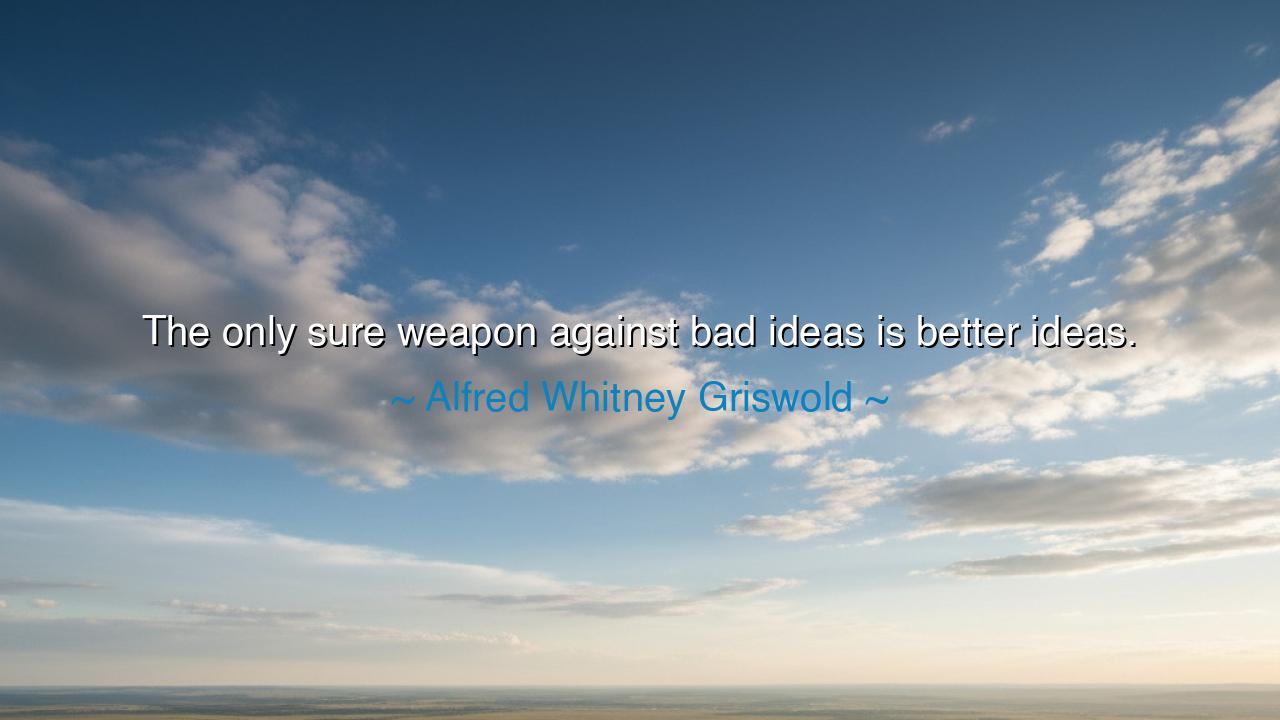
The only sure weapon against bad ideas is better ideas.






"The only sure weapon against bad ideas is better ideas." Thus declared Alfred Whitney Griswold, the philosopher, historian, and guardian of learning, who once guided Yale University through a time of change and challenge. His words, simple yet eternal, strike like the chime of a bell in the halls of reason. They remind us that ignorance cannot be conquered by silence, nor hatred by suppression, nor falsehood by force. Only through the light of truth, through the power of better ideas, can darkness be dispelled. Griswold’s saying is not merely a reflection on scholarship—it is a call to the eternal struggle between knowledge and ignorance, between the voice of understanding and the murmur of fear.
In the origin of this quote lies Griswold’s deep belief in education as the weapon of peace. As a university president during the mid-twentieth century—a time when the world had survived the flames of war and now entered the cold shadow of ideology—he saw societies gripped by propaganda, suspicion, and division. Many sought to silence opposing ideas by censorship or persecution, believing that to destroy a voice was to destroy the thought behind it. But Griswold, like the wise teachers of old, understood that ideas cannot be killed—they can only be replaced. He knew that the mind is a field that cannot lie fallow; if it is not sown with truth, it will bear the weeds of falsehood. Thus, he proclaimed that the only true weapon, the only lasting defense, is better ideas—those grounded in reason, compassion, and truth.
This truth has revealed itself again and again through history. Consider the age of Galileo, when the Church sought to silence him for proclaiming that the earth moved around the sun. They imprisoned his body, but not his idea. The truth he spoke burned quietly in the minds of those who came after him until, centuries later, it became the foundation of modern science. His opponents wielded authority and fear; he wielded a better idea—one rooted in evidence and observation. Time proved his triumph, for truth is eternal, and no prison can contain it. Thus, the words of Griswold echo through Galileo’s defiance: ignorance can be punished, but it cannot be conquered except by enlightenment.
We see the same pattern in the great struggles for freedom and equality. When tyranny rose, it was not swords or armies that defeated it, but the power of ideas more just and more humane. The American Revolution was not born from hatred of kings, but from the belief that liberty and self-governance are sacred rights. The abolition of slavery began not with rebellion, but with conscience—with men and women who dared to say, “This is wrong,” and who armed themselves not with muskets, but with truth. Even the peaceful revolutions of the modern age—those led by Mahatma Gandhi and Martin Luther King Jr.—were battles of ideas. They answered violence with vision, oppression with moral clarity. And in the end, it was not the might of the oppressor but the better idea of justice that prevailed.
Griswold’s wisdom is not confined to nations; it belongs also to the human heart. For within each of us, there is a battle between false and true ideas. The thoughts we harbor shape our character and destiny. When envy, prejudice, or fear take root, they can only be overcome by cultivating better ideas—by filling the mind with understanding, generosity, and courage. To fight evil with evil is to multiply darkness; to fight ignorance with hatred is to become ignorant oneself. But to confront error with truth, and cruelty with compassion, is to wield the only weapon that heals even as it defends.
The ancients knew this law of spirit. Socrates, accused of corrupting the youth of Athens, did not respond with anger or deceit. He met accusation with dialogue, ignorance with reason, insult with inquiry. His defense was not an appeal to power, but to wisdom. “The unexamined life,” he said, “is not worth living.” In this, he embodied Griswold’s teaching: that every battle of ideas must be fought with understanding, not destruction. For when we silence a man, we do not destroy his thoughts—we only bury them, where they may grow more dangerous. But when we meet falsehood with truth, we illuminate the path for all who follow.
So, my children of reason and courage, take this lesson as your armor in the conflicts of life: do not meet darkness with darkness, but with light. When faced with ignorance, do not mock—teach. When confronted by lies, do not rage—speak truth. When hatred rises, do not strike—understand. The surest way to defeat a bad idea is to offer a better one—one rooted in kindness, logic, and love for what is true. Let your words and deeds be instruments of illumination, for truth is a flame that no storm can extinguish.
And remember always the wisdom of Alfred Whitney Griswold: "The only sure weapon against bad ideas is better ideas." Arm yourself not with violence, but with thought. Forge your mind into a tool of discernment, your heart into a vessel of empathy. The world will always have bad ideas, but they need not triumph. For the human spirit, when guided by truth, can light even the darkest age—and in that light, ignorance will wither, and wisdom will reign eternal.






AAdministratorAdministrator
Welcome, honored guests. Please leave a comment, we will respond soon